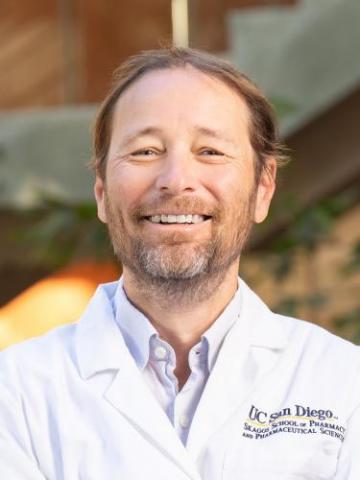
Pieter C. Dorrestein, Ph.D.
Professor
Skaggs School of Pharmacy and Pharmaceutical Sciences
Departments of Pharmacology and Pediatrics
Director, Collaborative Mass Spectrometry Innovation Center
Co-Director, Institute for Metabolomics Medicine
Our work aims to develop new mass spectrometry based methods to understand the chemistry of microbes, our microbiome and their ecological niche. In short, we develop tools that translate the chemical language between cells. This research requires the understanding of (microbial) genomics, proteomics, imaging mass spectrometry, genome mining, enzymology, small molecules structure elucidation, bioactivity screening, antibiotic resistance and an understanding of small molecule structure elucidation methods. The collaborative mass spectrometry innovation center that he directs is well equipped and now has twelve mass spectrometers, that are used in the studies to investigate capture cellular chatter (e.g. metabolic exchange), metabolomics, metabolism and to develop methods to characterize natural products. These tools are used to defining the spatial distribution of natural products in 2D, 3D and in some cases real-time. Areas of recent research directions are capturing mass spectrometry knowledge to understand the microbiome, non invasive drug metabolism monitoring, informatics of metabolomics, microbe-microbe, microbe-immune cells, microbe-host, stem cell-cancer cell interactions and diseased vs. non-disease model organisms and the development of strategies for mass spectrometry based genome mining and to detect and structurally characterize metabolites through crowd source annotation of molecular information on the Global Natural Products Social Molecular Networking at http://gnps.ucsd.edu through the NIH supported center for computational mass spectrometry that is co-developed with Nuno Bandeira. A more detailed biography can be found in this Nature article http://www.nature.com/news/the-man-who-can-map-the-chemicals-all-over-your-body-1.20035
Education: B.A. in Chemistry (1999) Northern Arizona University; Ph.D. in Chemical Biology (2004) Cornell University; NRSA fellowship in Bioanalytical Chemistry (2006) University of Illinois.
Awards and Honors: ACACC travel award by Lilly in Analytical Chemistry; V-foundation Scholar; Featured in the journal Scientist as a “Scientist to Watch”; Beckman Young Investigator; Pharmaceutical Research and Manufacturers of America Research Award, Hearst foundation award, Exceptional, Unconventional Research Enabling Knowledge Acceleration award NIH, Matt Suffness award ASP society, Scientific advisory for Analytical Chemistry and Natural Products Reports, Head of the biochemistry division, Abel award ASPET society, Remar-Luest Lectureship, Max Plank, Society for Industrial Microbiology and biotechnology award and Keynote, Karcher-Barton Lectureship, University of Oklahoma, NAU Dwight-Patternson Alumni of the year award, Blavatnik finalist, Editor ASM mSystems.
Leadership Experience: Mass Spectrometry in Medicine and Biology group at UCSD. The Collaborative Mass Spectrometry Innovation Center, The Institute for Metabolomics Medicine and UCSD Center for Microbiome Innovation.
- Cell Biology and Biochemistry
- Proteomics and mass spectrometry for biologists
- Chemistry of Enzyme Catalyzed reactions
- Chemical biology
- Contemporary topics in pharmacology
- System Wide Mass Spectrometry
- Marine Biotechnology
- Integrated Microbiology
In the past few years we have published 20-50 papers each year.
For an up-to-date publication list see:
We collaborate with numerous industrial and other partners on understanding of metabolomics data, therapeutic discovery, target ID, informatics of metabolomics and understanding the microbiome. Consultant or collaborator to nearly a dozen biotechnology companies for the detection and analysis strategies of molecules in agricultural, medical, personal care and biotechnological sectors. These aspects of collaboration can be arranged through the collaborative mass spectrometry innovation center or through the center for microbiome innovation. In the next year the lab will roll out the rapid response precision microbiome program.